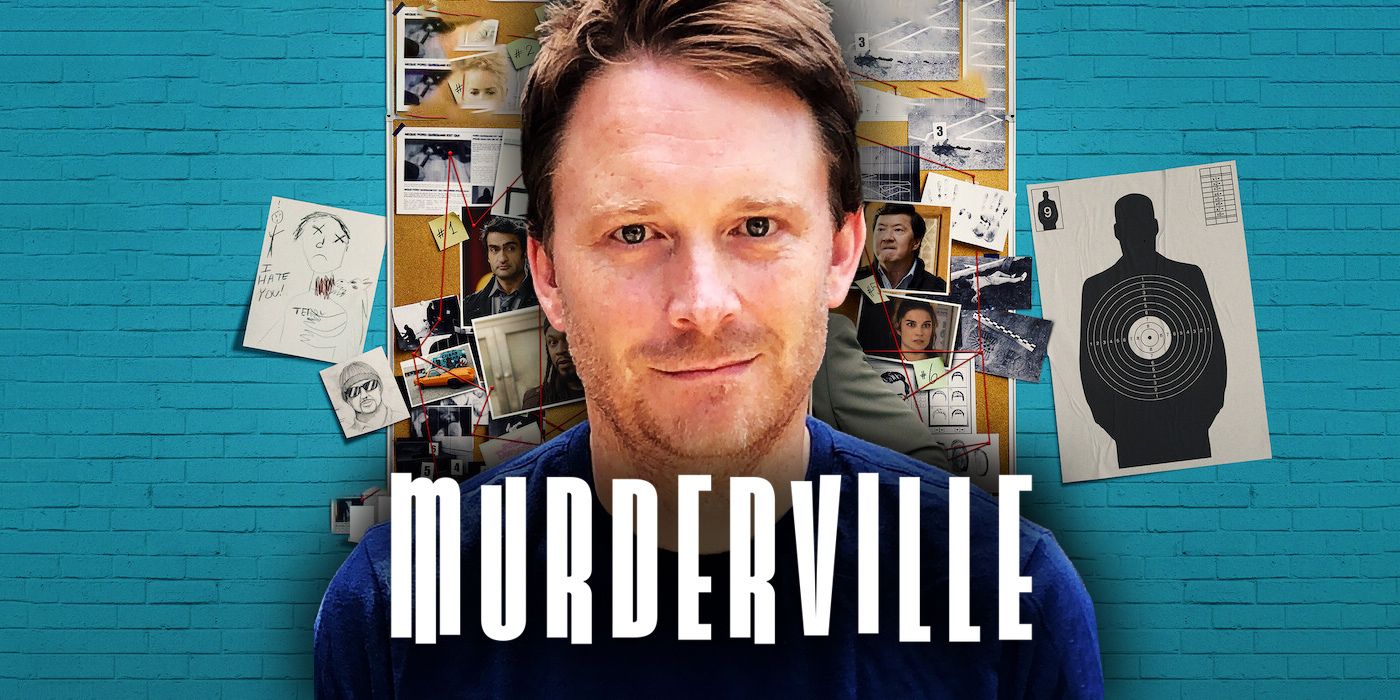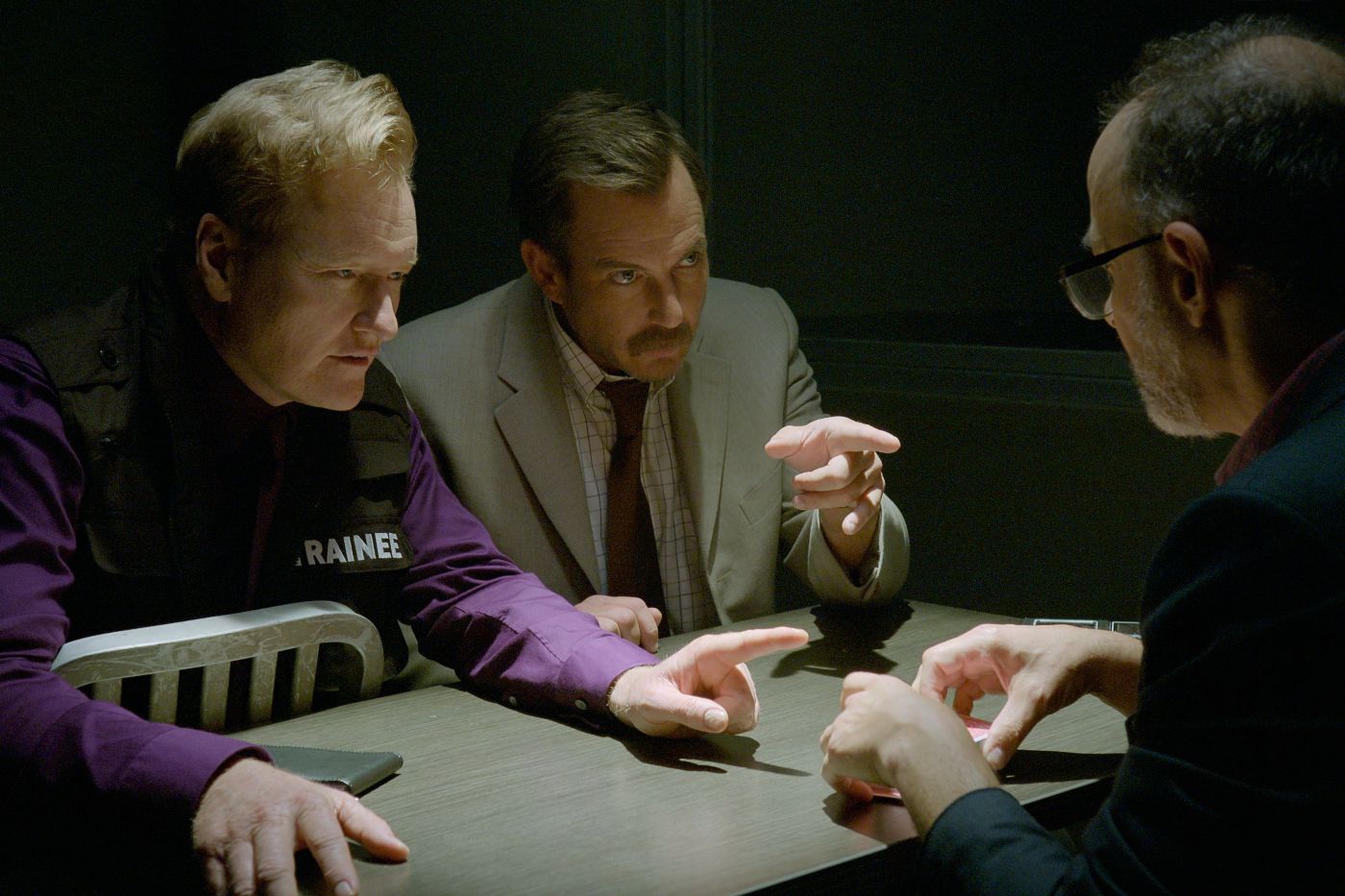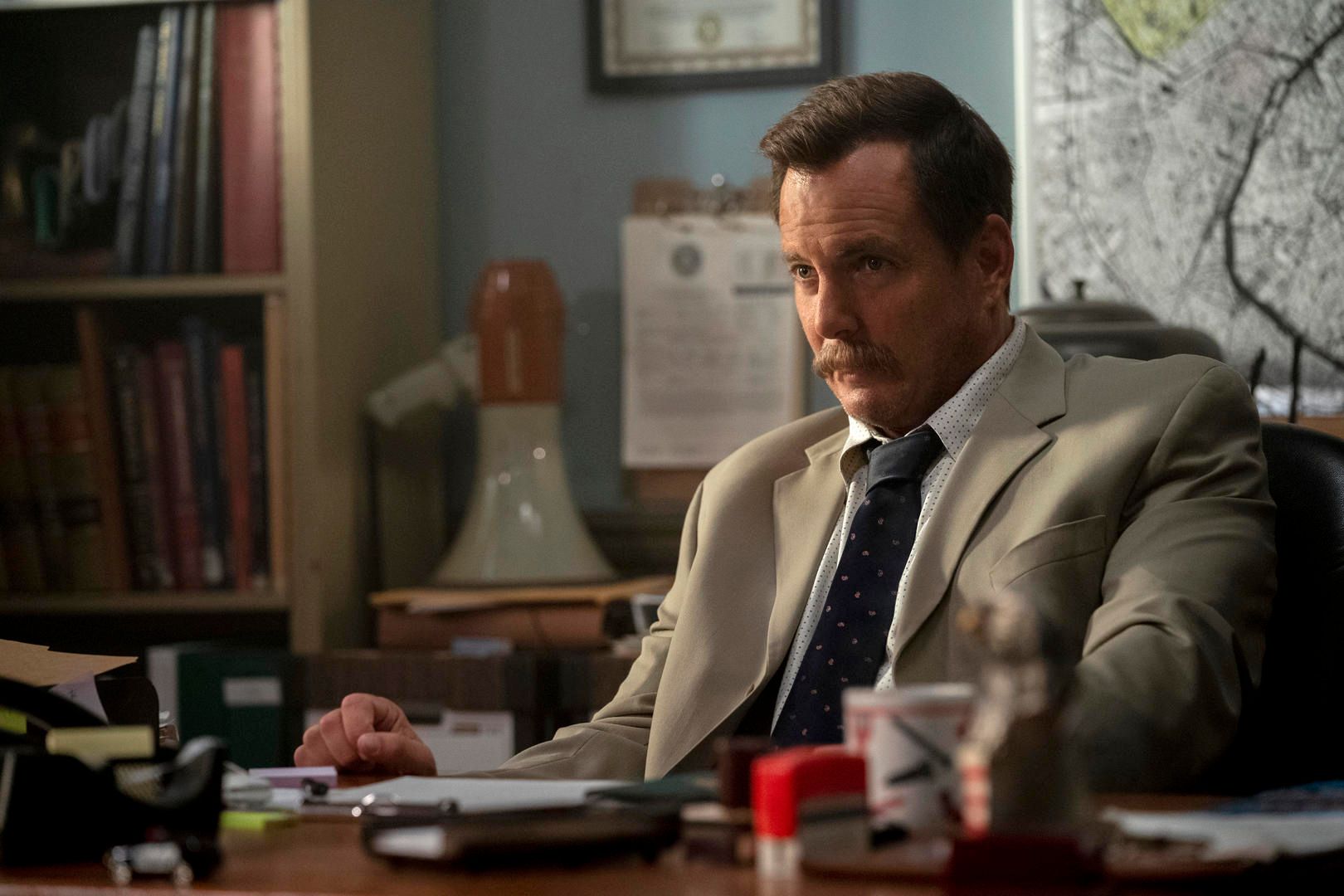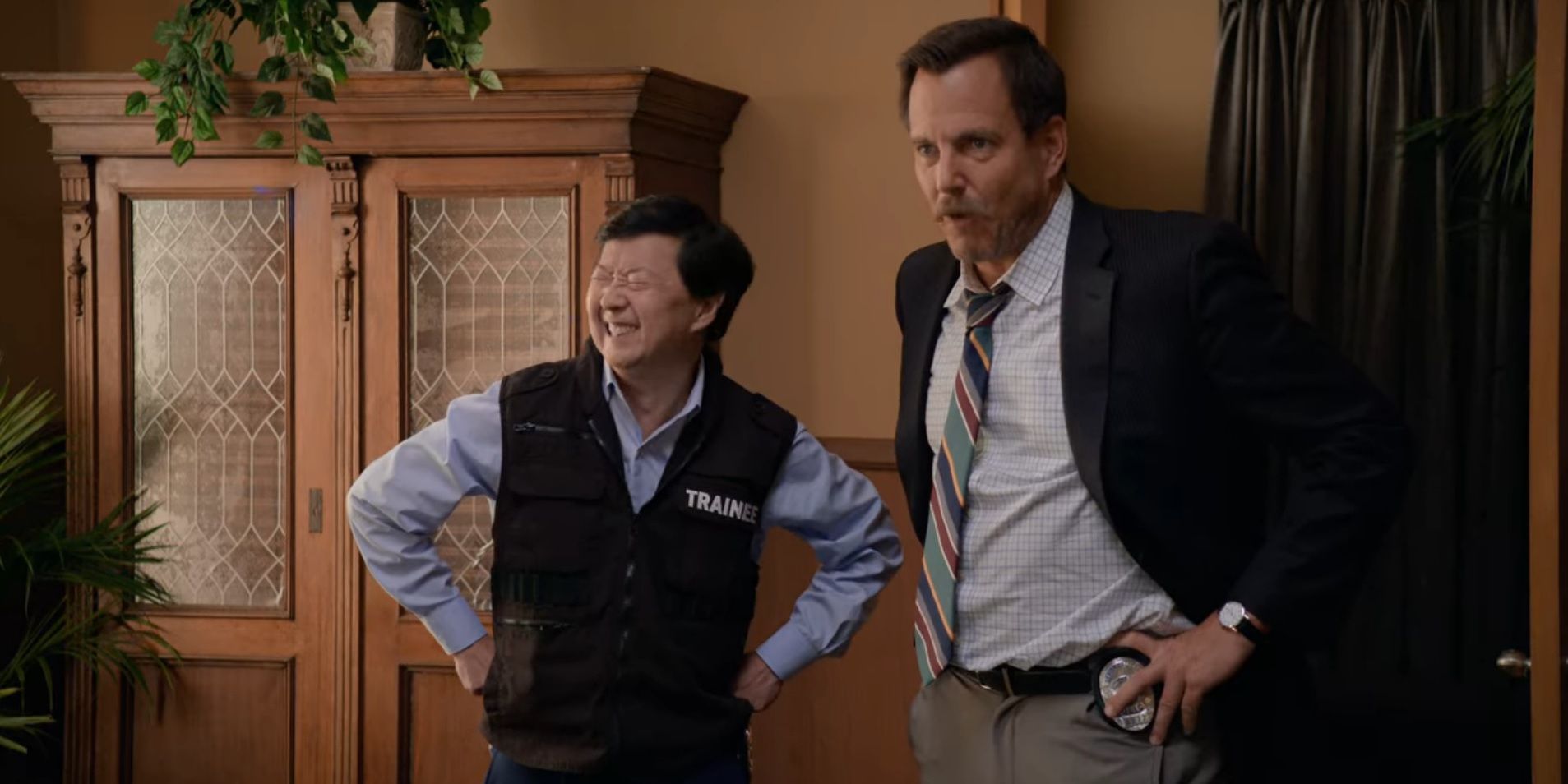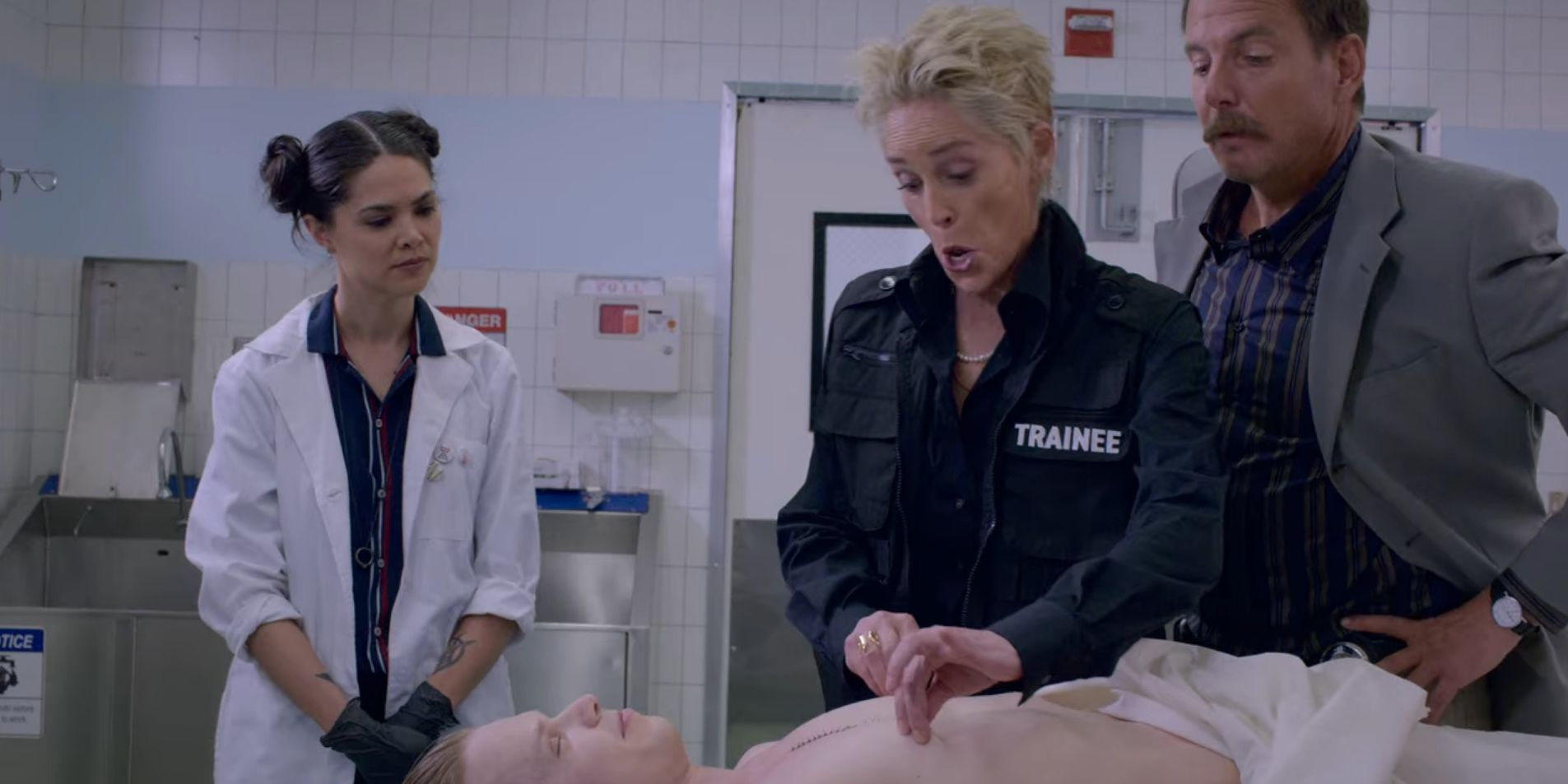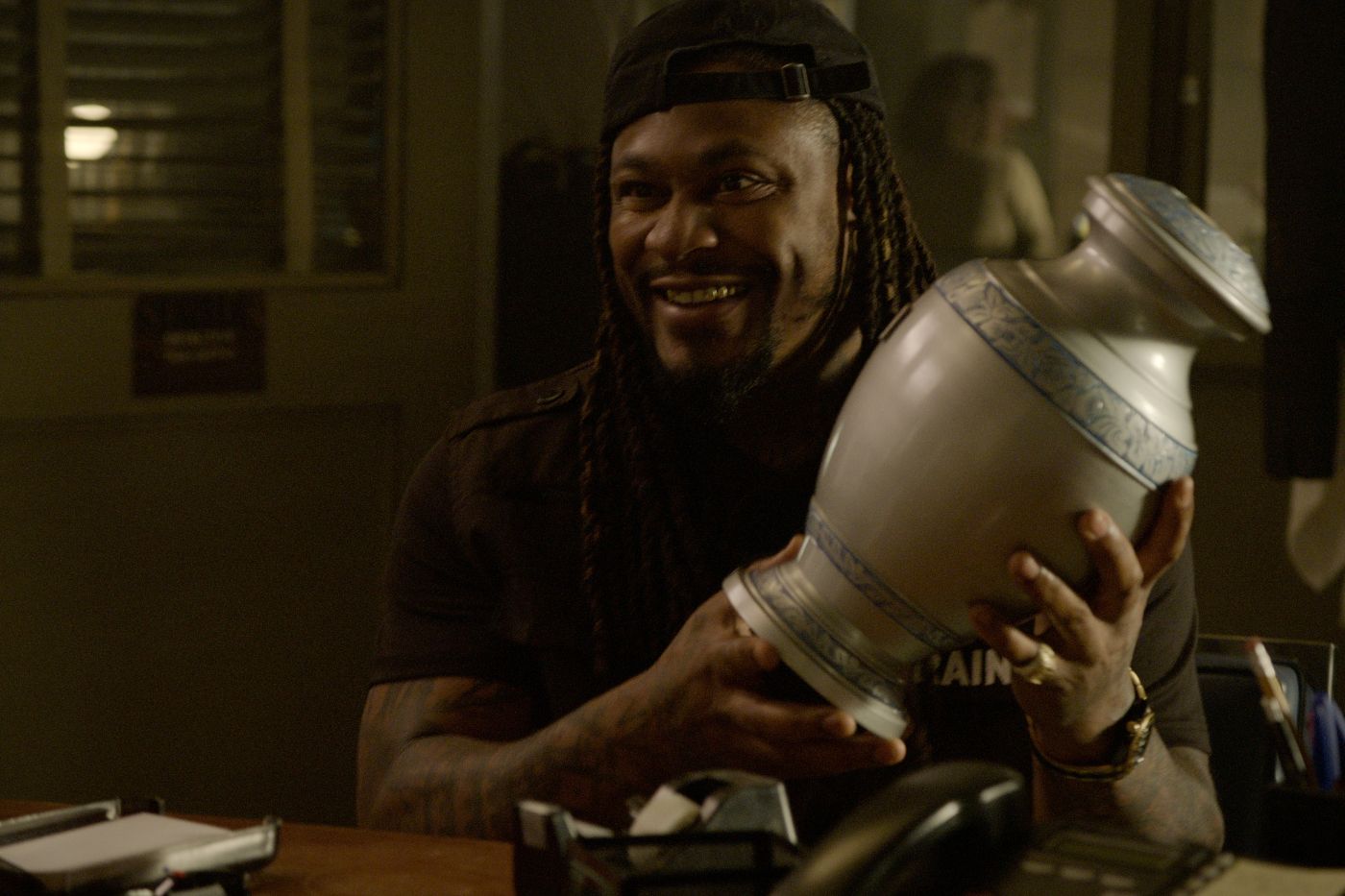From showrunner Krister Johnson, the new Netflix murder-mystery comedy series Murderville (loosely adapted from the BBC Three TV series Murder in Successville) revolves around all the familiar police tropes audiences know and love — with an improvisational twist. Senior Detective Terry Seattle (Will Arnett) is already struggling in the workplace: he's separated from his wife, Rhonda, who also happens to be the department's Police Chief (Haneefah Wood) and he's been haunted by the death of his partner Lori (Jennifer Aniston) since it happened years ago and officially moved into cold-case status, despite his best efforts to solve it. But there are new murders afoot, and with each case comes a brand-new celebrity partner who will pair with Terry in order to figure out whodunit. The only trick is: they're the only person in the episode who hasn't been given a script to follow and must improvise their way through the investigation before determining who the real killer is by the end.
Earlier this week, Collider had the chance to speak with Johnson by phone about developing Murderville. Over the course of the interview, which you can read below, the showrunner discusses how much of the story concept was developed before the show was shopped around and ultimately found a home at Netflix, how they got Aniston's permission to use her image in the series, and how he always wanted the solving of Lori's cold case to be the investigation that closed out the season. He also talks about how the series rewards both binge-viewing and hopping around between episodes, which celebrity guest was the biggest surprise in terms of improv skills, who got Arnett to break character the most on-set, and more.
Collider: I loved the show. I'm already wondering when there's going to be more.
KRISTER JOHNSON: The response has been really exciting. I'm so happy that it seems like it's reaching all sorts of different people, and they're all enjoying different parts of the comedy, which is really great. That's all I wanted, was to make a show that everyone can find something fun in. And this show certainly has a lot of different ingredients mixed in, so I'm happy that people seem to be enjoying it.
How did you come to be involved with the show? Because I know that it's taken from another version across the pond, so to speak. What attracted you to the concept? What made you want to adapt it for Netflix?
JOHNSON: The brief backstory is that Will Arnett saw the original show and fell in love with it. So his company worked for a long time to secure the rights to adapt it, and that all happened sort of before I became involved. But once they had it, they were looking for someone to work with them to adapt it. I had never seen the original show, and it was one of those moments where I started watching it and my two thoughts were honestly, like, "Ugh, why didn't I think of this?" More generally, "Why hasn't anyone done this before?" Because everyone's been trying to figure out how to capture the magic of improv without having to deal with the consequences of improv that goes astray.
I just thought the original show did a brilliant job of creating a framework and a narrative around which to hang these improvised moments that would allow truly unexpected things to happen, but always have sort of guardrails up to move along in a compelling story. So I met with Will's company, I told them that I would love to do it and I had some ideas about things I might change from the original.
The biggest change between ours and the original is the original, Murder in Successville, takes place in this fictional town where every resident is a celebrity, and they're all played by different actors impersonating them, but they're not known for the things that we know them for as celebrities. So, just as an example, Taylor Swift, played by an impersonator, shows up in an episode as a medical examiner.
I felt like I wanted to focus more on just the gameplay with the guest and the star of the show, but also I wanted to have a bit more fun with the police procedural genre in America, which is one of those things that anyone who watches TV kind of knows in their bones and knows the tropes and knows the beats. Removing that element that they had allowed us to establish a few more characters and build out the world around Terry Seattle and the precinct. We were very, very lucky to end up at Netflix who were excited about it and understood what was great about the original and what we wanted to do. And that was how it all started.
You mentioned having the story pitch in hand when you were shopping it around, before it landed at Netflix. Terry Seattle's character and backstory and the cold case that haunts him — that was already planned out?
JOHNSON: In a general sense, it was. The one thing I knew was that especially for Netflix, which really loves people to binge things — and people [who] watch Netflix are looking for some sort of serialized content if it's there or can be there. This was the nut to crack for us, because given the fact that it is a case where there'd be a different celebrity you'd see in one episode and then never again it was going to be largely episodic, but we wanted some sort of throughline, and we had discussed different stories that could carry us through.
The original pitch definitely had a chief who he was estranged from, a boss who he was about to get divorced from. And I believe that it even had the death of his former partner. We had sort of gone back and forth on different ideas, but that general structure was there. Most importantly, I knew that I wanted to pay off that storyline in the final episode, so that there would be a break in that old case and then solving that old murder would be the case of the week for the final episode of the season.
That was one of the things I definitely wanted to talk to you about, which was this show having, like you said, the kind of overarching plot that carries through the season that comes full-circle. This is a show that does reward the binge a little bit, because, in the finale, you get callbacks to pretty much everything that's come before, even just one-off jokes that have previously appeared. Like I think I'm thinking of the scene where Will is giving Ken Jeong the code words —
JOHNSON: He's rolling on the various catchphrases or weird references throughout.
Yeah. So there's that, but then also it does feel like you could even just pop in and revisit episodes individually if you wanted to.
JOHNSON: I think "reward" is definitely the right word. We knew that with a show like this and with sort of big-name celebrities, there were going to be people who might see the show, look at the episodes and say, "Oh my God, Annie Murphy, I'm going to start there." And we didn't want them to be lost. We didn't want them to be at a disadvantage or not know pieces of the story. So the serialized part really is a bonus. It's added value. I would love it if everyone started at the beginning and went straight [through], but if they jumped around a bit, they should know that it's definitely worthwhile to start at the beginning and watch it through again. Not just for the cold case, but I think watching the slow destruction of Terry's personality is pretty fun as well.
Speaking of big-name celebrities, though, I have to ask about getting Jennifer Aniston as Lori. What was that conversation like in having to secure her image for this?
JOHNSON: I know it's a pretty wild out-of-nowhere thing. The truth is that Will and Jen have known each other for years, so that was a personal relationship. There was an earlier version that we were thinking of where we might have had an actual flashback to the night of her death and for various reasons, it was just too much, and it was going to take focus off what was going on in the episode. But once we decided that this person was only going to be seen in a photo, we thought, "Well, let's just get the biggest and most unexpected piece up on that wall." It's just thanks to her. She thought it was a funny idea and she and her team signed off on it. So up it went.
This season really boasts some people that you would expect to see, and then some people that are just completely delightfully surprising. What was the process was like in trying to approach people for these guest spots?
JOHNSON: The truth is that we had no idea what kind of level of guests we were going to be able to get from the show. Especially with a first season, we could show people the British version, but it's a very different vibe, so we just weren't sure. Will and Conan [O'Brien] know each other very well and are friends and I think Will reached out to him to say, "Hey, I'm doing this show. It'll be fun. It'll take two days. You don't have to play anything, you just goof around." Thankfully, Conan said yes. I think once Conan was officially aboard, then it became a little easier to go to people and say, "This is a real thing. We're not lunatics over here."
But with Sharon [Stone], we did just reach out to her. The reason I remember her saying yes... she had never met Will as best I remember, but she loved him. She loved his work, and she wanted to work with him, and that's honestly the strongest thing we had going for booking people. They love Will. He's a genuinely lovely person. He's incredibly funny and creative, and a lot of people were just like, "Yes, that would be a great thing. I would love to do that." I was surprised and elated at the kind of people who we managed to rope into this crazy experiment for the season.
You've mentioned before that each episode was about two days to film, production-wise, but then you have to cut that down to around 35 minutes or so. I imagine in doing that, there's probably a fair amount that winds up on the cutting room floor. Are there any outtakes that we didn't get to see? Any chance of them being released at some point?
JOHNSON: It was a very interesting thing editing it, because we actually didn't cut any scenes except for, I think, one in Marshawn [Lynch]'s episode that I do believe we're releasing as an outtake. And it related to Aunt Vivian and the ashes and sort of finishing up that storyline, which was great, and I loved it, but it wasn't directly related to the case. It just felt like it was a little too much. The reason we couldn't cut any of those other scenes... it's not like a movie where this scene just doesn't really move us forward, we can find another way to move the story forward. We had clues and story points in all those big scenes and for the audience to be able to play along, we couldn't have them miss anything. We couldn't have the guests seeing things and picking up clues that weren't seen by the audience as well. So we were kind of locked-in, structure-wise.
At that point, it really became about the best moments within those scenes and how to tie those various moments together. Because we would do no more than two takes of any scene, and we would generally use take one as far as the guest experience. By that, I mean the cameras were on the guest for that first one because we wanted their natural reaction to it. We wanted their unprepared-in-any-way response to the situation around them. Then the second take was more getting coverage or Terry or other suspects or any closeups or things we needed. But those scenes sometimes ran long. We tried to leave them kind of rolling for a long time to see what would come up.
There would be certain moments that were really funny, but kind of ended in dead ends. That's just the nature of improvising through a moment. So the trick really was, "Okay, what are the best moments in this stuff? And how do we tie it together in the scene, so it really feels like there's a beginning, middle, and end to this part of the story and not just sort of a random collection of insanity?" As far as outtakes, it's really funny. I think we do have a bunch and I believe Netflix is going to start sharing them. I think they shared one yesterday. What was so funny about it is that we don't really have deleted scenes aside from the one I mentioned.
Then the other category is bloopers, when things go awry, but that's like the most important part of our show. That's what is the most enjoyable. To me, that is kind of the real story we're telling, right? We've set up this world that is a police procedural drama, and we're moving through that story. But the real story that people are watching is, "This person who I know from TV or film got dropped into this and has no idea what's going to happen." This, for them, isn't the reality of Murderville. It's the reality of being on a set, shooting a TV show, and not having a script.
So, the screw-ups and the stammering and the laughter and the giggling, and Will breaking as well, is all part of the actual story that I want to tell, which is what happens when you put someone in this situation. The truth is that a lot of those moments that usually end up on the cutting room floor were things that I was just like, "That is going in. That is amazing. Put that in. He's leaning over, trying to hide his face, because his mustache is going to fall off. Because he's laughing. That's going in the show."
Which guest was most surprising in terms of their improvisational abilities, and which guest caused Will or any of the other actors to break the most, by your recollection?
JOHNSON: Marshawn. As far as improvisation goes, Marshawn was the biggest surprise. Yes, we all knew he could be very funny, but that was often in the context of just him being Marshawn in his world. What's amazing about what he does here is that he is so sharp and so dialed in, and so in the moment, but he's also playing by these crazy rules we've set up. He's buying into being Will's partner. He makes a decision basically that he will do anything for Will within the first two minutes. And it's wonderful.
We do these long office scenes initially where the guests and Will get to know each other and Will just walked offset after the first one and came over to video village with his eyes wide and just raised his arms up in triumph, because it was like we knew we had something remarkable. We knew we had someone who nobody was going to expect was going to come in and just take over his scenes in the most delightful way and have a take on the situation that was totally unexpected.
As far as breaking Will, Conan definitely got to him. There's an outtake that I think will come out at one point where... I won't give too much away, but it's in the murder scene from Conan's episode and Will again brings up Tommy Tune and Conan just goes on a rant that destroys Will, and it's a wonderful thing to see.
Kumail [Nanjiani] also really had fun with it and was just... what was so great about Kumail is that he's just a uniquely talented person, but he wasn't just willing to go along with things. He was willing to allow us to see him processing things, and he was also willing to question and push back and interject and have fun kind of knifing Will's character in various small, deft ways. The two of them together, it wasn't so much that Kumail would say something that would break Will. It's that they would end up in scenarios where they were both breaking, like the whole funny walking and all. They just found a way to end up in conversations or in moments that both of them could barely handle, which was really fun to watch.
Murderville is currently available to stream on Netflix.

